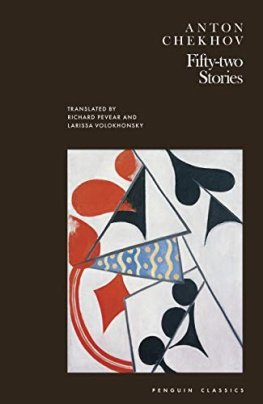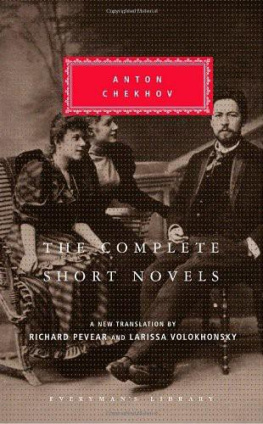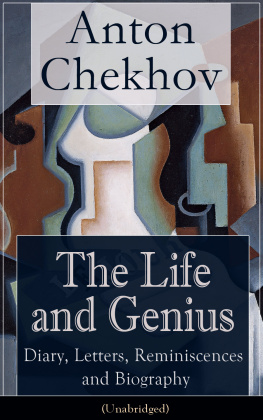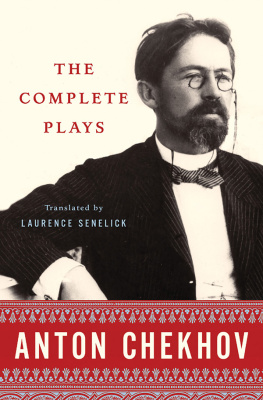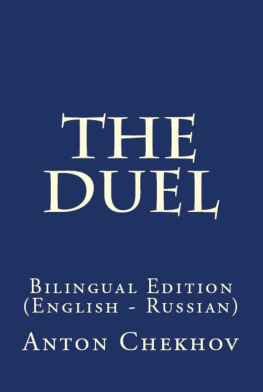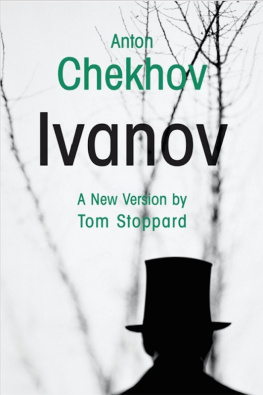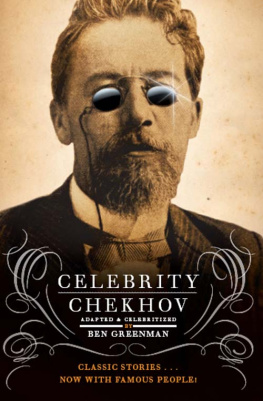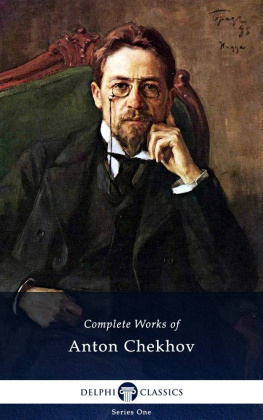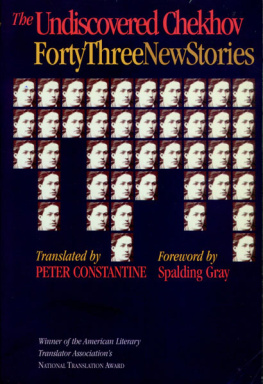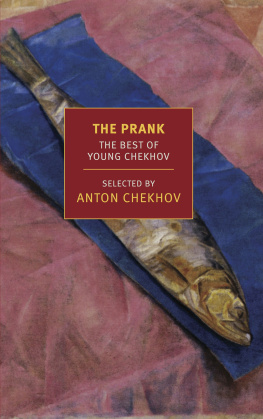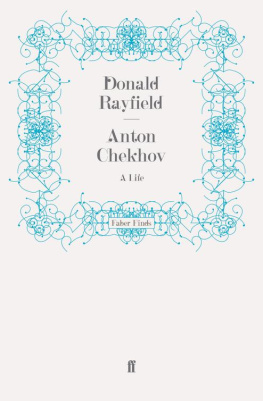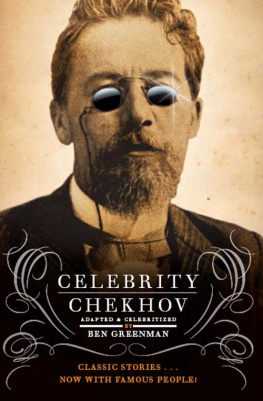ALSO TRANSLATED BY RICHARD PEVEAR AND ARISSA VOLOKHONSKY
Mikhail Bulgakov
The Master and Margarita
Anton Chekhov
The Complete Short Novels of Anton Chekhov
Selected Stories
Fyodor Dostoevsky
The Adolescent
The Brothers Karamazov
Crime and Punishment
Demons
The Double and The Gambler
The Eternal Husband and Other Stories
The Idiot
Notes from a Dead House
Notes from Underground
Nikolai Gogol
The Collected Tales of Nikolai Gogol
Dead Souls
Nikolai Leskov
The Enchanted Wanderer and Other Stories
Boris Pasternak
Doctor Zhivago
Alexander Pushkin
Novels, Tales, Journeys
Leo Tolstoy
Anna Karenina
The Death of Ivan Ilyich and Other Stories
War and Peace
THIS IS A BORZOI BOOK PUBLISHED BY ALFRED A. KNOPF
Copyright 2020 by Richard Pevear and Larissa Volokhonsky
Preface copyright 2020 by Richard Pevear
All rights reserved. Published in the United States by Alfred A. Knopf, a division of Random House LLC, New York, and distributed in Canada by Penguin Random House Canada Limited, Toronto.
www.aaknopf.com
Knopf, Borzoi Books, and the colophon are registered trademarks of Penguin Random House LLC.
Library of Congress Cataloging-in-Publication Data
Names: Chekhov, Anton Pavlovich, 18601904, author. | Pevear, Richard, [date] translator. | Volokhonsky, Larissa, translator.
Title: Fifty-two stories (18831898) / Anton Chekhov ; a new translation by Richard Pevear and Larissa Volokhonsky.
Description: New York : Alfred A. Knopf, [2020] | Translated from the Russian.
Identifiers: LCCN 2019022613 (print) | LCCN 2019022614 (ebook) | ISBN 9780525520818 (hardcover) | ISBN 9780525520825 (epub)
Subjects: LCSH : Chekhov, Anton Pavlovich, 18601904Translations into English.
Classification: LCC PG 3456. A P 484 2020 (print) | LCC PG 3456. A 13 (ebook) | DDC 891.73/3dc23
LC record available at https://lccn.loc.gov/2019022613
LC ebook record available at https://lccn.loc.gov/2019022614
Ebook ISBN9780525520825
This is a work of fiction. Names, characters, places, and incidents either are the product of the authors imagination or are used fictitiously. Any resemblance to actual persons, living or dead, events, or locales is entirely coincidental.
Cover design by John Gall
ep_prh_5.5.0_c0_r0
C ONTENTS
P REFACE
Our intention in making this collection has been to represent the extraordinary variety of Chekhovs stories, from earliest to latest, in terms of characters, events, social classes, settings, voicing, and formal inventiveness. By chance the selection came to fifty-two storiesa full deck! But, as Chekhov once wrote, in art, as in life, there is nothing accidental.
When Chekhov began to write humorous stories and sketches, he thought he was doing it simply for money. And so he was. His fathers grocery business, in their native Taganrog, on the Sea of Azov, had gone bankrupt in 1876, and to avoid debtors prison the family had fled to Moscow, where Chekhovs two older brothers were already studying at the university. Chekhov, who was sixteen at the time, stayed behind to finish high school, supporting himself in various ways, one of them being the publication of humorous sketches in local papers, signed with various pseudonyms. In 1879 he graduated and moved to Moscow himself, where he entered medical school, and where his writing, still pseudonymous, became virtually the sole support of the familymother, father, four brothers, and a sister.
Chekhov paid no attention to the artistic quality of his sketches; he simply tossed them off, sometimes several a day, and sent them to various daily or weekly humor sheets, whose editors gladly printed them. But his true artistic giftinnate, intuitiveshowed itself even in the most exaggerated, absurd, and playful of these early jottings. They were mainly jokes, often satirical, but he also played with words in them, for instance in naming his characters. In At the Post Office (1883), the postmasters name is Sweetpepper and the police chiefs name is Swashbuckle. The French tutor in In a Foreign Land is Monsieur Shampooing, the French word for shampoo. Corporal Whompov is the heavy-handed officer in the story named for him. In An Educated Blockhead (1885), the name of the accused is Slopsov and the justice of the peace is Sixwingsky, suggestive of a seraph. In Romance with a Double Bass (1886), the main character, owner of the double bass, is named Bowsky, after the instruments articulator; we also run into such men as Buzzkin, Flunkeyich, and Flaskov. And there are others. These names have almost always been simply transliterated in English, giving no hint of their literal meaning in Russian.
After 1886, Chekhov stopped using such overtly comical names, but in later stories we still find characters like Zhmukhin in The Pecheneg (1897), whose name, while credible enough, also suggests pushing, squeezing, oppression. Chekhov also persisted in his transcribing of noises. The dog in The Teacher of Literature (1894) does not simply bark; his grrrnya-nya-nya-nya pervades the story. The night owl in The Pecheneg keeps calling Sleep! Sleep! The wind howls Hoo! Hoo! And in his descriptions of nature there is a pervasive anthropomorphismtrees that swoon, rivers that speak, the malicious, but deeply unhappy storm in On the Road (1886), the previous days mist in Fear (1892), which timidly pressed itself to the bushes and hummocks. In a letter of May 10, 1886, to his older brother Alexander, who was also trying to be a writer, he offers some advice:
For instance, you will succeed in depicting a moonlit night if you write that on the mill dam a piece of glass from a broken bottle flashed like a bright star and the black shadow of a dog or wolf rolled along like a ball and so forth. Nature comes alive if youre not squeamish about comparing natural phenomena to human actions
Yet in a letter dated January 14, 1887, to an acquaintance, Maria Kiselyova, who complained to him that he kept digging in the dung heap of immorality, Chekhov asserts: What makes literature art is precisely its depiction of life as it really is. Its charge is the unconditional and honest truth. And further on he says of the writer: Hes no different from the run-of-the-mill reporter. It is true that Chekhovs stories are filled with details of everyday existence, often very dark and always very keenly observed. He had an unusually wide personal experience of Russian life on all levels, and portrays a great variety of people: landowners, peasants, the military, bureaucrats, farmers, townspeople, clergy high and low, provincial school teachers, intellectuals, university students, boys, mistresses, wives, hunters, shepherds. In one story the central character is a boy two years and eight months old; in another the central character is a dog. But the stories he tells about them are hardly run-of-the-mill reporting.
The formal variety of Chekhovs stories is also far from slice-of-life realism. Sometimes he chooses suspended momentson a train, on the road, in a cartthat allow for unexpected revelations, or pseudo-revelations. Many are essentially monologues, which occasionally lead to surprise reversals. In The Siren (1887), after a court session, the court secretary entices his superiors, even the stern philosopher, with an inspired and minutely detailed five-page discourse on Russian eating and drinking, ending with honey-spice vodka, of which he says: After the first glass, your whole soul is engulfed in a sort of fragrant mirage, and it seems that you are not at home in your armchair, but somewhere in Australia, on some sort of ultrasoft ostrich There are doublings, as in the early Fat and Skinny or the late Big Volodya and Little Volodya. In his notes for the rather grim story The Bet (1889), he first refers to it as a fairy tale. The formal qualities of storytelling, of parables, anecdotes, and morality tales, are present throughout his work. It is nurtured by tradition, though he puts that tradition to his own use.
Next page
